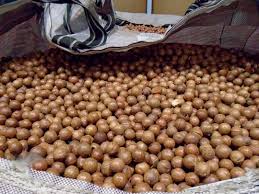South African macadamia nut farmers are bracing for a major economic shake-up as the United States considers implementing steep import tariffs that could significantly impact the country’s lucrative nut exports. Among those directly affected is Gene Likhanya, a pioneering farmer in the lush Madimbo valley, who has built his thriving business over 20 years using personal savings and local labour.
Likhanya, 40, who now employs 78 workers and recently harvested 25 tonnes of macadamia nuts from his farm, is one of many growers feeling the heat from the proposed 31% U.S. tariff on South African macadamia exports. Though the tariff announcement by former U.S. President Donald Trump on April 2 has been temporarily paused for negotiations, it has already shaken confidence in the American market.
South Africa is currently the world’s largest producer of macadamia nuts, and the United States is its second-biggest market after China. The nuts, prized for their rich, buttery flavour and growing popularity in health-conscious food trends, have become a significant source of income for thousands of South African farmers.
“This tariff situation has made us realise that we can’t put all our nuts in one basket,” Likhanya told Reporters during an interview on his farm. “We are already actively exploring other international markets. India is one of them.”
With a population of over 1.5 billion people and rising interest in premium, healthy snacks, India presents a promising new destination for South Africa’s macadamia industry. Talks with potential buyers and distributors in India are already underway, Likhanya confirmed.
While seeking alternatives, farmers like Likhanya are also calling for calm and hoping for a diplomatic resolution between the two governments.
“It’s a lose-lose if you look at it closely,” Likhanya, who also serves as a board member of Macadamias South Africa (SAMAC), the country’s main growers’ association, explained. “America imports our macadamia kernels, which are then further processed locally. So, not only are our farmers at risk, but so are U.S. jobs tied to the supply chain.”
The broader agricultural sector in South Africa has also voiced concern. Citrus growers, who export approximately $100 million worth of fruit to the United States annually, have warned that U.S. tariffs could put up to 35,000 industry jobs at risk.
For macadamia farmers, who have spent years building out farms, acquiring certifications, and forming international partnerships, the tariff uncertainty represents a major hurdle—especially in rural areas like Madimbo, where agriculture is a primary source of employment.
The U.S. has historically maintained favourable trade relations with South Africa through programs like the African Growth and Opportunity Act (AGOA), which has helped boost exports of agricultural goods and other products. But recent geopolitical tensions, shifts in trade policy, and retaliatory tariff strategies have started to strain these ties.
Analysts say the current stand-off is rooted in Washington’s attempt to balance trade relationships seen as uneven, but critics argue that the imposition of tariffs on developing economies could be counterproductive and harmful to sectors that rely on consistent trade flows.
In response, Macadamias South Africa and other stakeholders are urging the South African government to proactively engage in negotiations and look to diversify export markets more aggressively. Countries in Asia, the Middle East, and even parts of Europe have been flagged as potential future buyers of macadamia products.
Meanwhile, Likhanya remains optimistic about the future of his farm, which he dreams of transforming into a larger agribusiness hub over the next four years. He hopes to triple production, invest in on-site processing facilities, and provide more jobs for local youth—if the external challenges can be managed.
“We can’t sit back. This is our livelihood. We’re going to fight smart, explore new paths, and make sure that our nuts are still reaching consumers all over the world,” he said.
As global demand for macadamia nuts continues to rise, South African farmers may yet find opportunity in adversity—if they can adapt quickly enough to shifting trade winds.
